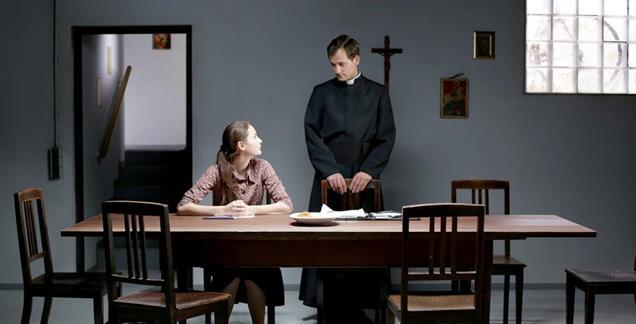Focus on Germany section - review - STATIONS OF THE CROSS by Dietrich Bruggemann
 Religion has been cause of re-examining in the last while in European cinema. Watching a film like Bruggemann’s latest work Stations of the Cross, one would be forgiven for being reminded of the simplistic style of Seidl’s Paradise: Faith from 2012. Yet, it doesn’t take very long to realise that this is a project that pushes cinematic boundaries and is not afraid to also bring the level of its standards a lot higher.
Religion has been cause of re-examining in the last while in European cinema. Watching a film like Bruggemann’s latest work Stations of the Cross, one would be forgiven for being reminded of the simplistic style of Seidl’s Paradise: Faith from 2012. Yet, it doesn’t take very long to realise that this is a project that pushes cinematic boundaries and is not afraid to also bring the level of its standards a lot higher.
This is the story of a fourteen year old girl Maria, who is on the verge of sexual awakening and adulthood. Yet, this natural process of growing up is slowed considerably by her conscience, tainted and brainwashed by the obsessive religiousness of her family – particularly her strictly old fashioned Catholic mother – and her Priest. For these two, sex is sin but so is the music that invites lustful activities.
There are many things to be admired about the style in which Bruggemann brings his story to life. Firstly, as its title implies, the structure of the film is heavily influenced by the 14 stations of the cross. Secondly, these are 14 shots in fact carefully implanted and constructed, adding a stillness not unlike a theatrical approach. Rarely, does the camera move at all. On that note, it was revealed that each scene was shot in one day.
Each of this scene in Stations of the Cross portrays the martyrdom of Maria. As it is implied earlier on in the film, she is gradually becoming convinced that giving up her life would help her little brother’s speech paralysis – thoughts to extreme as to be even dismissed by the radical priest that tells her to give up anything from dancing to eating cakes.
 The character of the priest is a particularly sinister figure. Portrayed by a great Florian Stetter, he speaks softly and calmly as he implants the seed of unhealthy religious obsession in the fragile consciences of children. The film opens, in fact, with a powerful long monologue in which he tells them on Sunday school how to behave in the true and righteous Catholic way. Equally as impressive is the central performance by the young girl, Lea van Acken, whose cinematic immaturity makes her performance all the more real and genuinely responsive to the actions around her.
The character of the priest is a particularly sinister figure. Portrayed by a great Florian Stetter, he speaks softly and calmly as he implants the seed of unhealthy religious obsession in the fragile consciences of children. The film opens, in fact, with a powerful long monologue in which he tells them on Sunday school how to behave in the true and righteous Catholic way. Equally as impressive is the central performance by the young girl, Lea van Acken, whose cinematic immaturity makes her performance all the more real and genuinely responsive to the actions around her.
Comments could be brought up about Germany’s own reasons for making this film from its own history of brainwashing to Pope Ratzinger’s die hard Catholic views. Yet, what appears to be most haunting is the screenplay’s perfect balance and non-judgemental approach that lacks the preachy take even Paradise: Faith had. In fact, one could go as far as to say that Stations of the Cross is just as much the story of a modern sainthood as it is about the dangers of religious extremism.